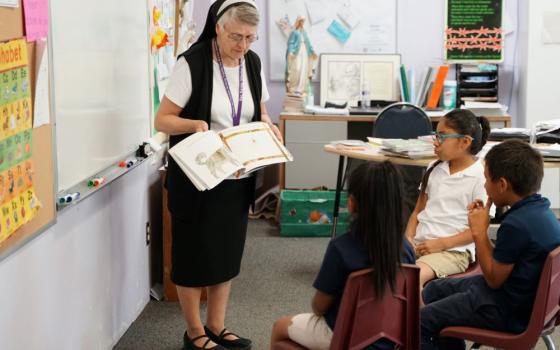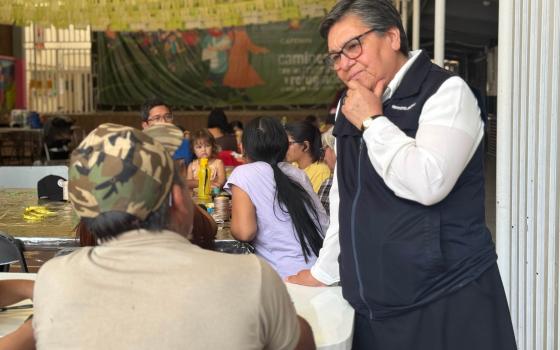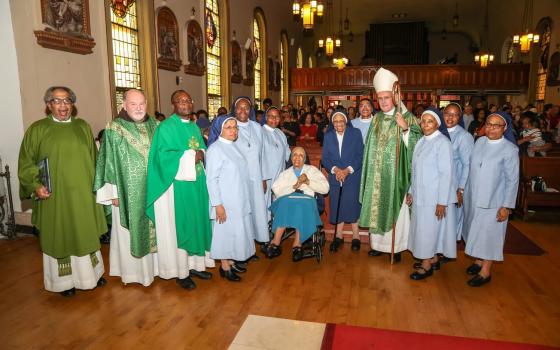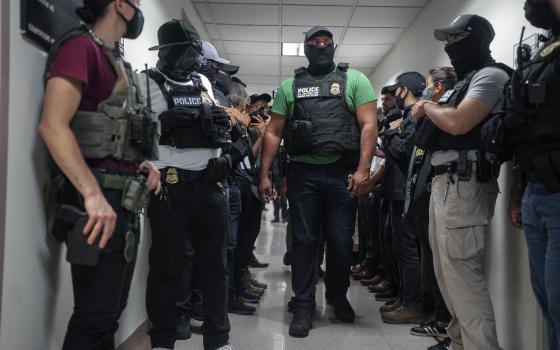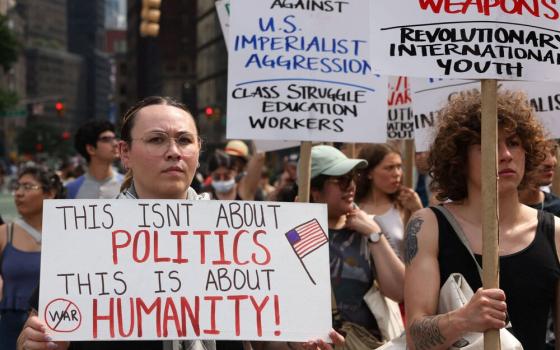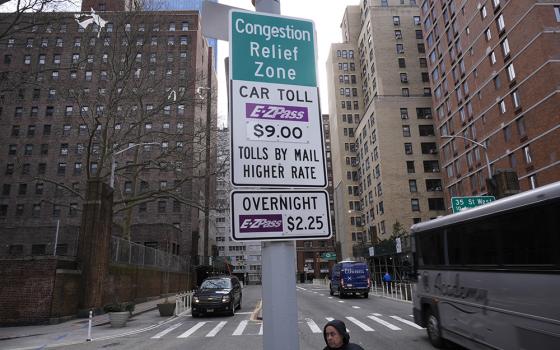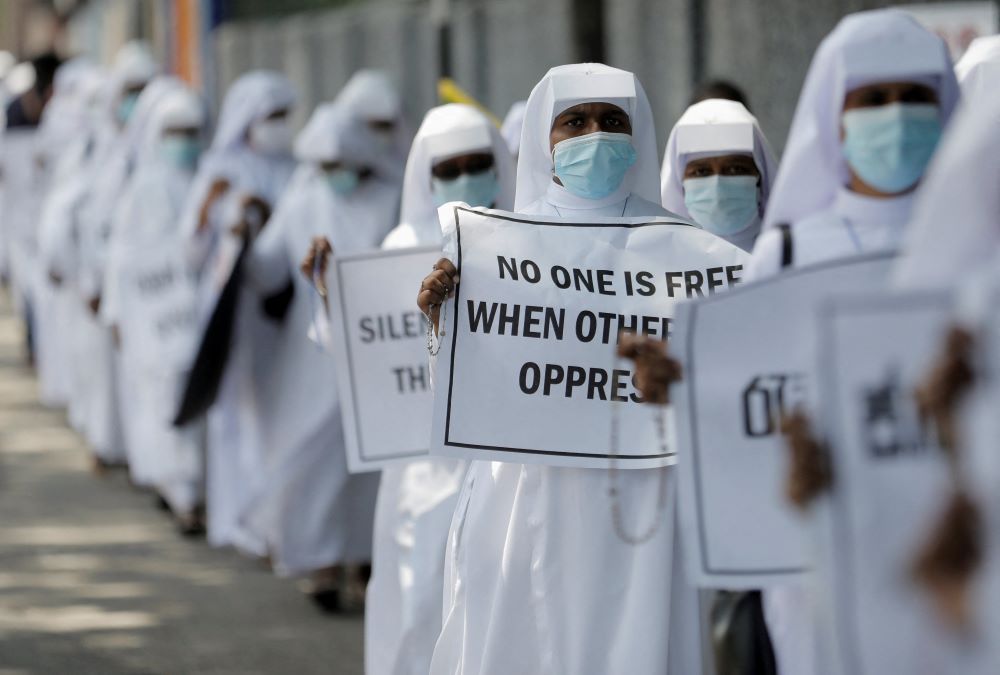
Nuns hold placards during a protest demanding Sri Lankan President Gotabaya Rajapaksa step down in Colombo April 5. Rajapaksa is trying to stabilize his government after mass protests prompted most of his Cabinet to resign. (CNS/Reuters/Dinuka Liyanawatte)
The sisters and postulants in a Salvatorian formation center in Sri Lanka have been eating their food and vegetables raw for more than a week.
"It is not part of any Lenten sacrifice or practice, but we have no gas to cook them," said Sr. Dulcie Peiris, the superior of the convent in Kandy, near the national papal seminary.
"I went thrice to fetch a cooking gas exchanged with our empty cylinder, but had to come back disappointed," said the nun who led a peace movement in Sri Lanka for over a decade to improve relations between Sinhalese and Tamils.
Not only is there an acute shortage of cooking gas, "we have no fuel to travel, no public transports, no electricity and medicines," the nun said in a feeble voice as she returned from a protest rally and prayer meeting Palm Sunday, April 10, at the national seminary.
Peiris said she has never experienced such a situation in Sri Lanka, "not even during the 30 years of civil war," said the nun, who is in her early 50s.
The civil war in Sri Lanka raged from 1983 to 2009 between the majority Sinhalese and the minority Tamils. More than 100,000 civilians and 50,000 soldiers were estimated to have been killed in the 25-year war.
Reporting from India, Global Sisters Report interviewed several sisters in Sri Lanka, which is facing its worst economic collapse since its independence in 1948. The nation is experiencing massive inflation with a foreign exchange shortage leading to a gas, fuel and power shortage and increased prices for basic goods like food, medicine and fuel, which are in short supply.
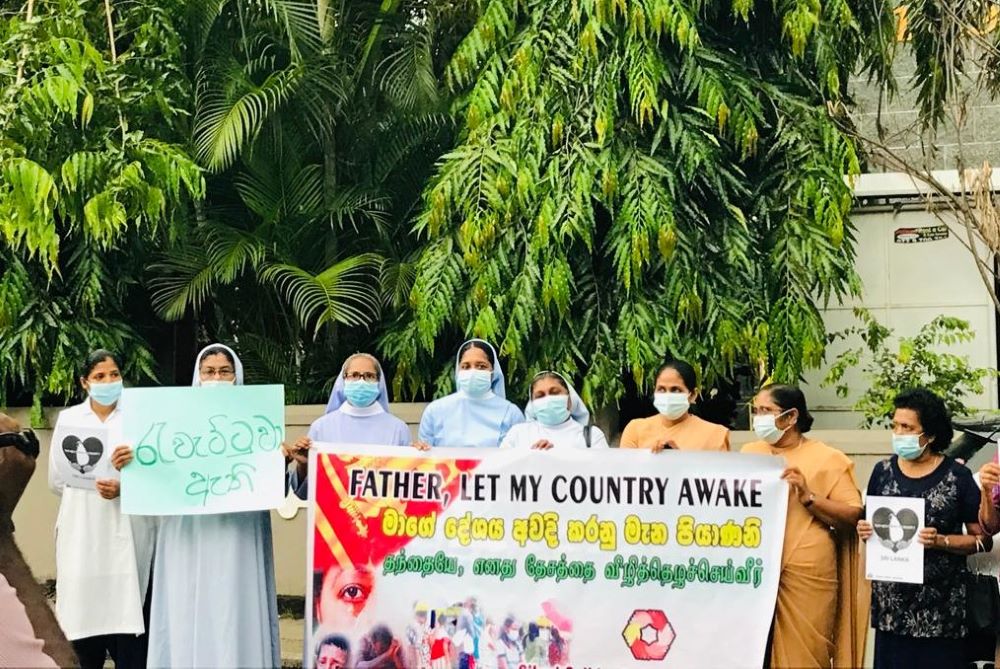
Sr. Shiroma Kurumbalapitiya, provincial of the Salvatorian sisters in Sri Lanka (center), leads a protest rally in Badulla. (Courtesy of Shiroma Kurumbalapitiya)
Catholic bishops, priests and nuns marched in the streets of Colombo on April 6 with placards, banners and slogans protesting government policies and demanding the resignation of President Gotabaya Rajapaksa and his team. The cardinal also joined the protest rally.
Peiris said the major superiors of the Catholic nuns in Sri Lanka had called for joining the nationwide protests against the government that have taken place since mid-March. The government caused this economic crisis "with their corruption and greed," she said.
Colombo Cardinal Malcolm Ranjith also had called upon all Catholics, including priests and religious, to express solidarity with the common people protesting against the government.
In response, the nuns have joined the people, protesting and demanding solutions to the problems.
The bishops of the Church of Ceylon, the Anglican Church in Sri Lanka, also have organized massive protests in response to the shortages of food and essential goods and economic crises.
The country is mired in debt after taking huge loans from international sources, especially China. Two years of the pandemic and a loss of revenue from the tourism sector have affected country's repayment capacity.
Good Shepherd Sister Dinalika Perera told GSR that their orphanages and homes for the elderly are facing acute food shortages, including rice and milk powder as well as cooking gas.
She said while some people have been supporting them so far, the sisters don't know how long the help will last. "Even the common people are struggling to have one meal a day, and how can they support us?" she asked.
'If more than 300 people had died in Easter bombings three years ago, more people are dying during this Easter season for want of essential medicines and food.'
—Sr. Shiroma Kurumbalapitiya
Villagers and poor farmers are the most affected in Sri Lanka as they do not have money to buy essential items whose prices are increasing daily.
The Good Shepherd convent in Nayakanda, near Colombo, houses more than 100 orphaned children, women and old people in addition to members of the congregation.
Sr. Prothmary Marianatham of the Sisters of the Holy Family, who lives in the northern province of Jaffna, told GSR that many Sri Lankan families are facing an acute famine, with no money.
"They have not suffered so much even during the war times," said the Holy Family nun from the Tamil ethnic region. The civil war has left deep wounds between Sinhalese and Tamils and even now, not many developmental programs are implemented for the Tamils. As a result, many Tamils have taken refuge in India during the civil wars and during this famine.
She said people have to stand in long lines for just about everything and "there is no end to it."
Advertisement
Meanwhile, former Sri Lankan Prime Minister Ranil Wickremesinghe on April 10 blamed the current government for plunging the country into deep economic and political crises.
He also praised India for its help "to the maximum" during these crises. India is sending food, medicine and fuel that keeps Sri Lanka alive, he said.
Inflation hit 18.7% in March, with food costs increasing up to 30%
UCANews reported, quoting Transparency International Sri Lanka, that the current situation "has been caused by decades of misuse and mismanagement of public resources on a large scale, corruption, and an overall lack of transparency and accountability in both governance as well as in the public service sector."
Shyami Siriverdana, a former employee of the Colombo Plan, said: "So far, the protest rallies were peaceful and everyone including young and old are in the streets since a week." Her parents and husband participated in the protests.
"Anyway, we have no power at home, and it is better to be at streets," she said. Sri Lanka often has power outages 10 to 13 hours a day.
She said there were one or two violent protests in front of the president's home, but generally "people have no strength to fight now."
Demonstrators react after they set a fire to a bus parked at the top the road to Sri Lankan President Gotabaya Rajapaksa's residence during a protest in Colombo March 31. Bishop Winston Fernando, president of the Sri Lankan bishops' conference, said successive governments were responsible to varying degrees for the present economic crises. (CNS/Reuters/Dinuka Liyanawatte)
Sr. Shiroma Kurumbalapitiya, provincial of the country's Salvatorian nuns, said the Catholic religious of Sri Lanka have decided to join with the struggles of the people at this crucial time.
She spoke to GSR on April 10 as she was preparing to go to Palm Sunday Mass and a protest rally at Kurunegala, a Buddhist stronghold province.
She said the country's misfortune started with the 2019 Easter attacks, followed by two years of the COVID-19 pandemic.
"If more than 300 people had died in Easter bombings three years ago, more people are dying during this Easter season for want of essential medicines and food," she said.
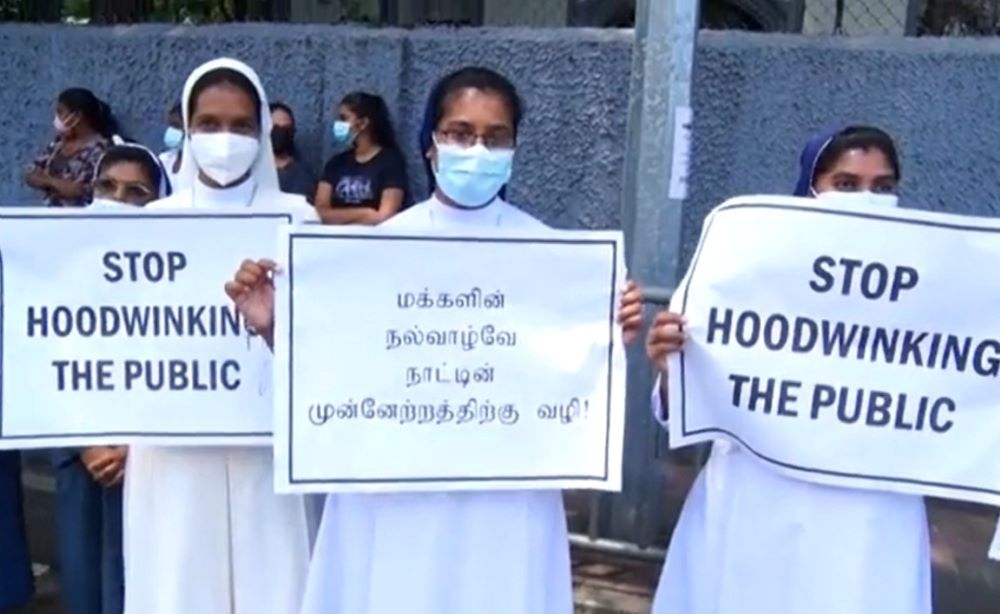
Sisters participate in a protest rally in Colombo, Sri Lanka, on April 6. Hundreds of sisters and priests joined the people’s rally in Colombo in solidarity. (Courtesy of Dulce Peiris)
The health ministry said last week Sri Lanka was facing severe shortages of 40 essential drugs and dwindling supplies of another 140 key medications. In a letter addressed to the president on April 7, the Sri Lanka Medical Association warned of a catastrophic number of deaths, likely to be in excess of the combined death toll from COVID, the 2004 tsunami and the civil war.
Several projects like the Mattala Rajapaksa International Airport and Chinese-funded infrastructure such as express highways connecting the entire island, and Colombo Port City have not yielded revenue for the country.
Meanwhile, it has been reported that thousands of Ukrainians who came as tourists before Russia invaded their country Feb. 24 are stranded in Sri Lanka "The debt-ridden Sri Lanka is also taking care of them," Kurumbalapitiya said.

